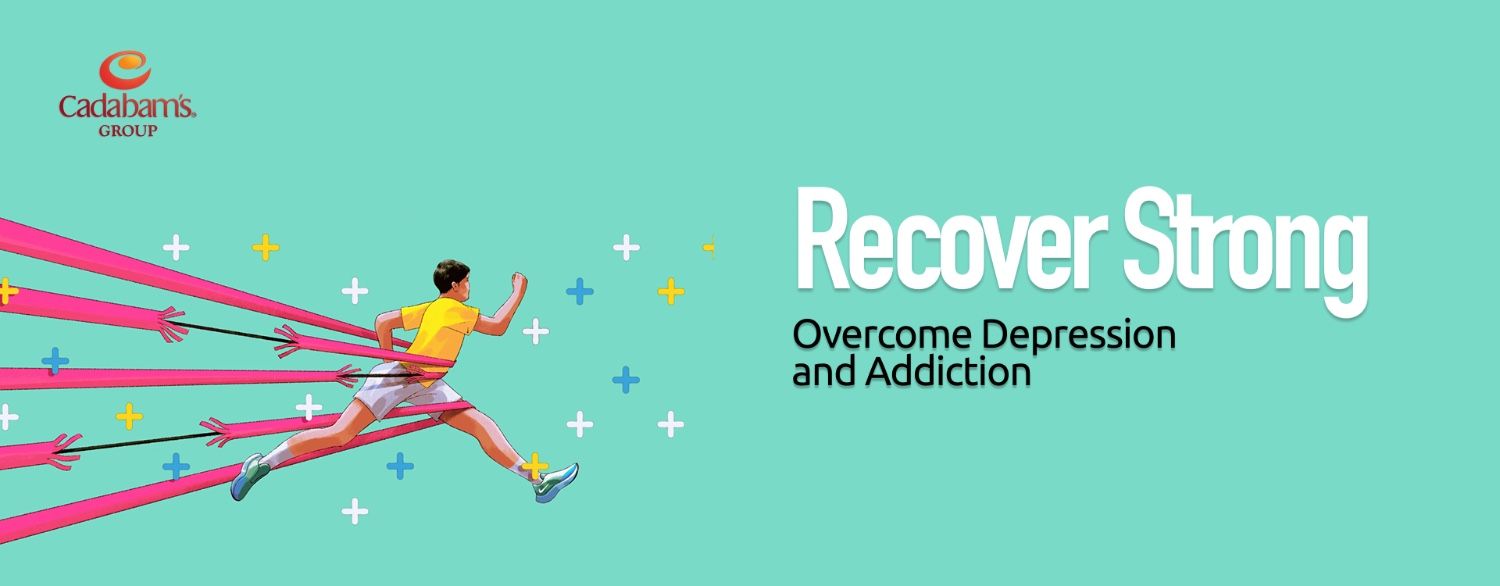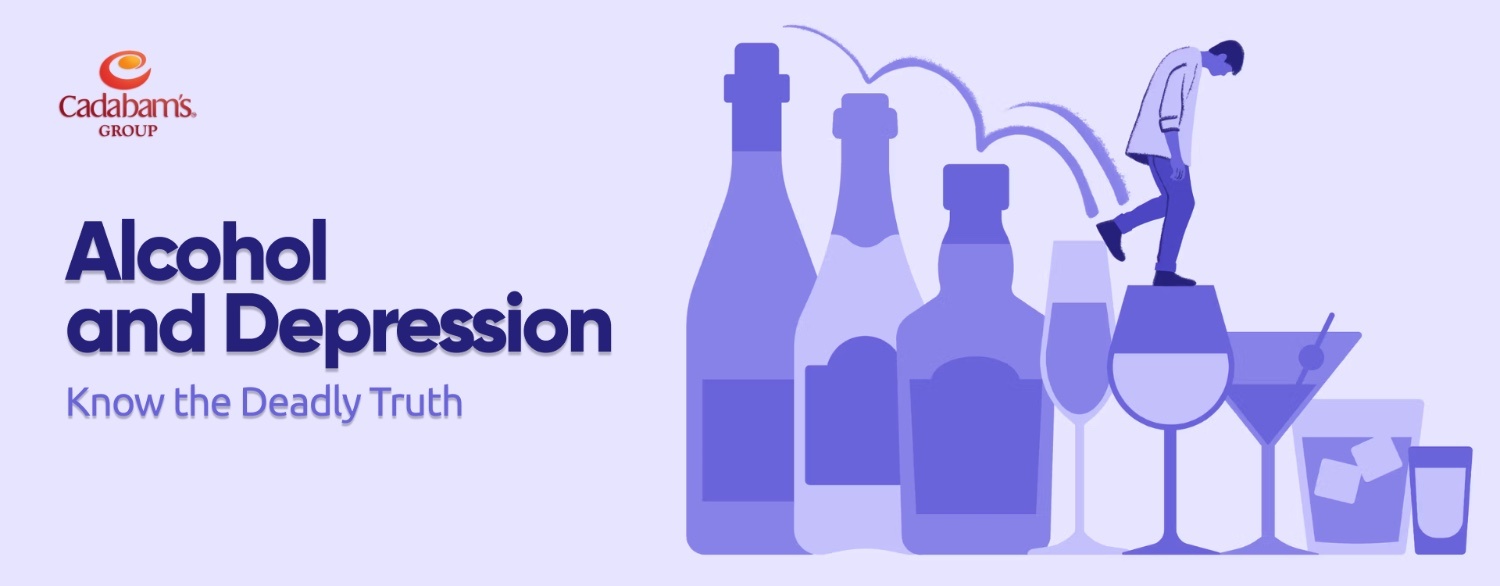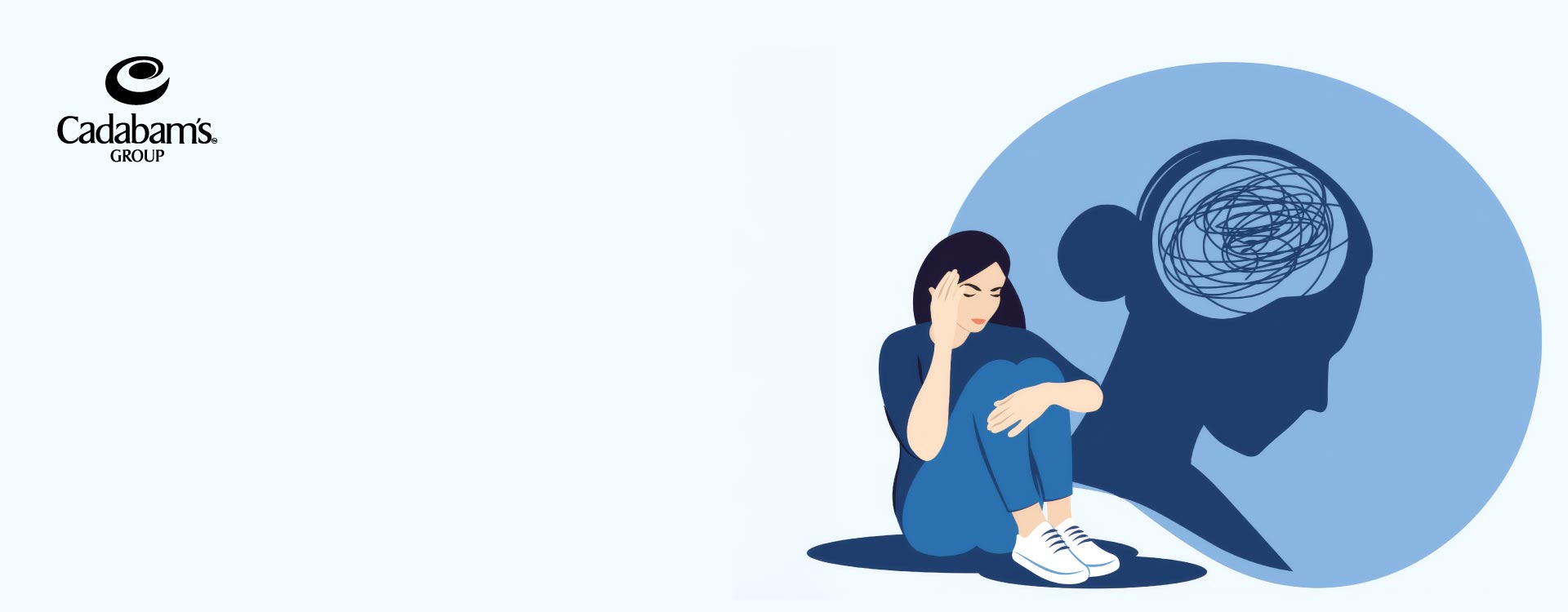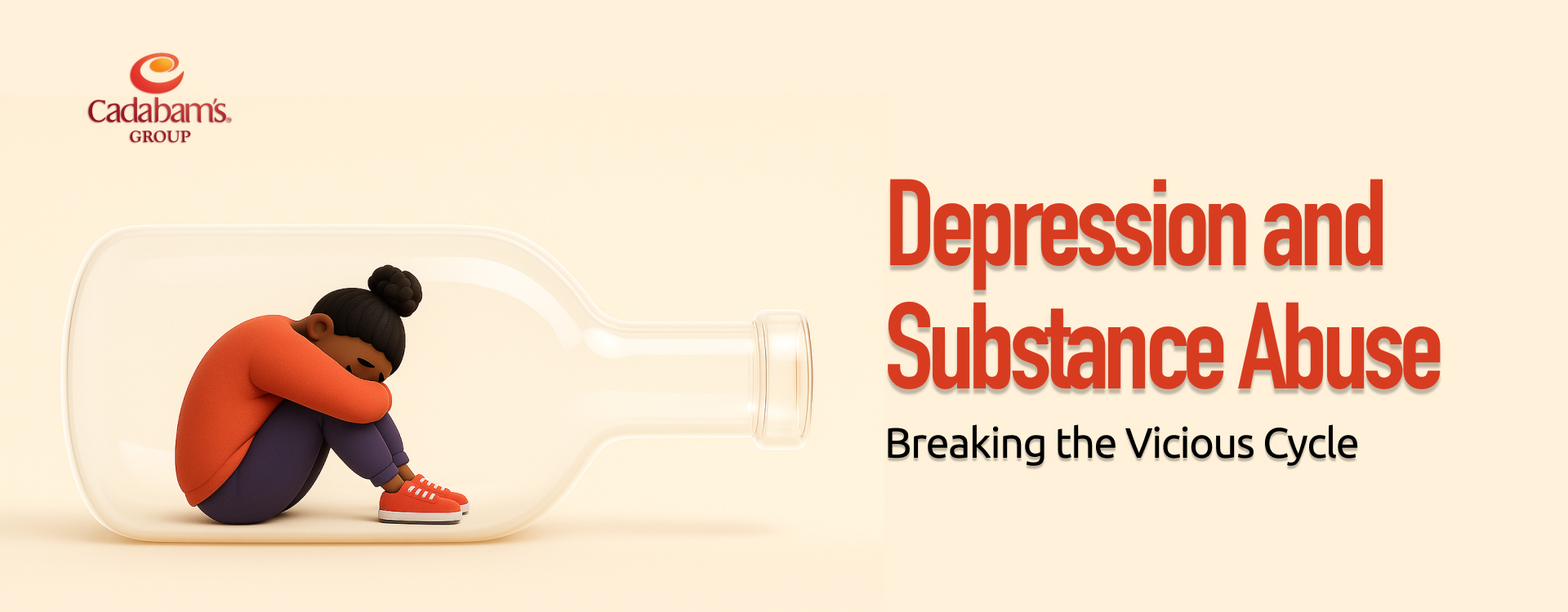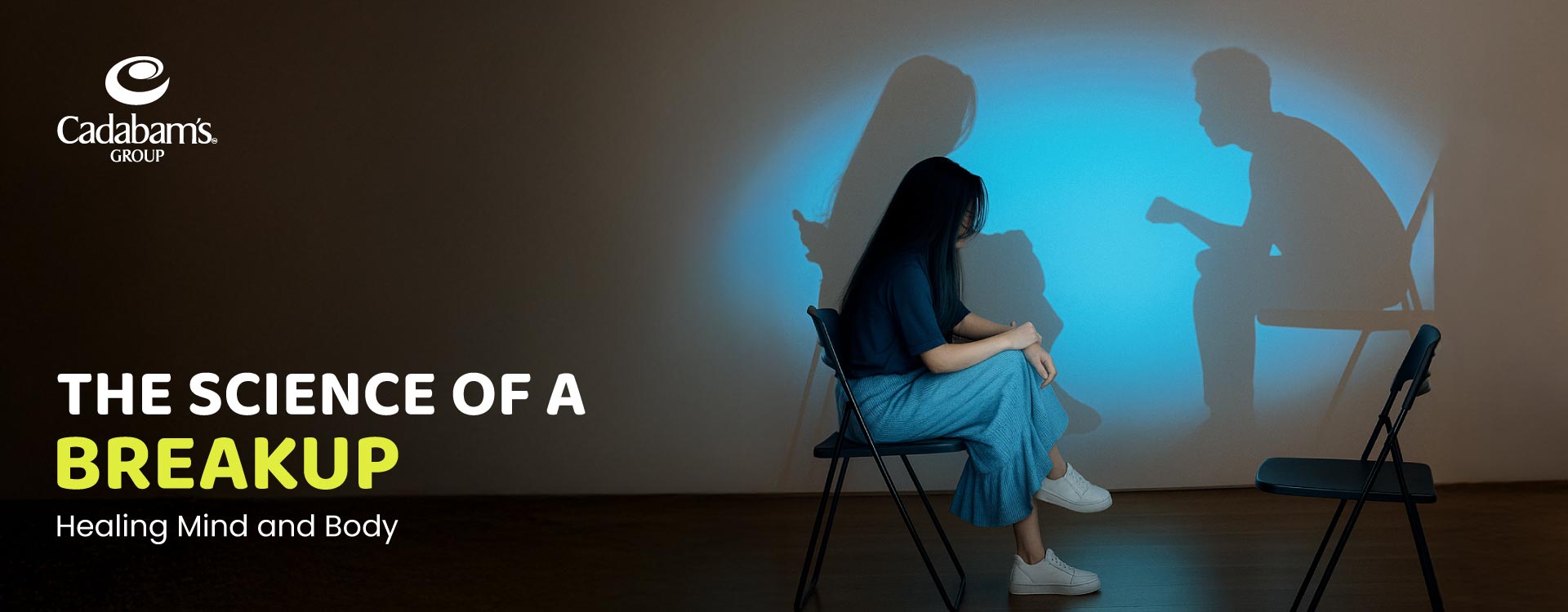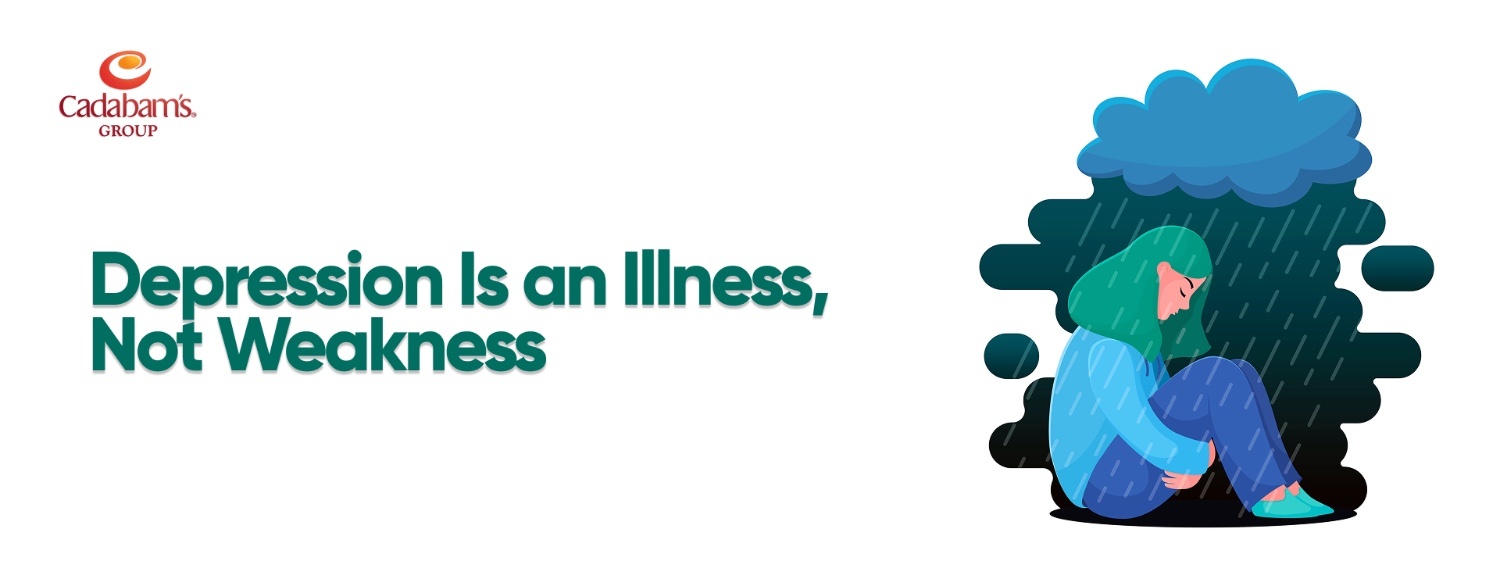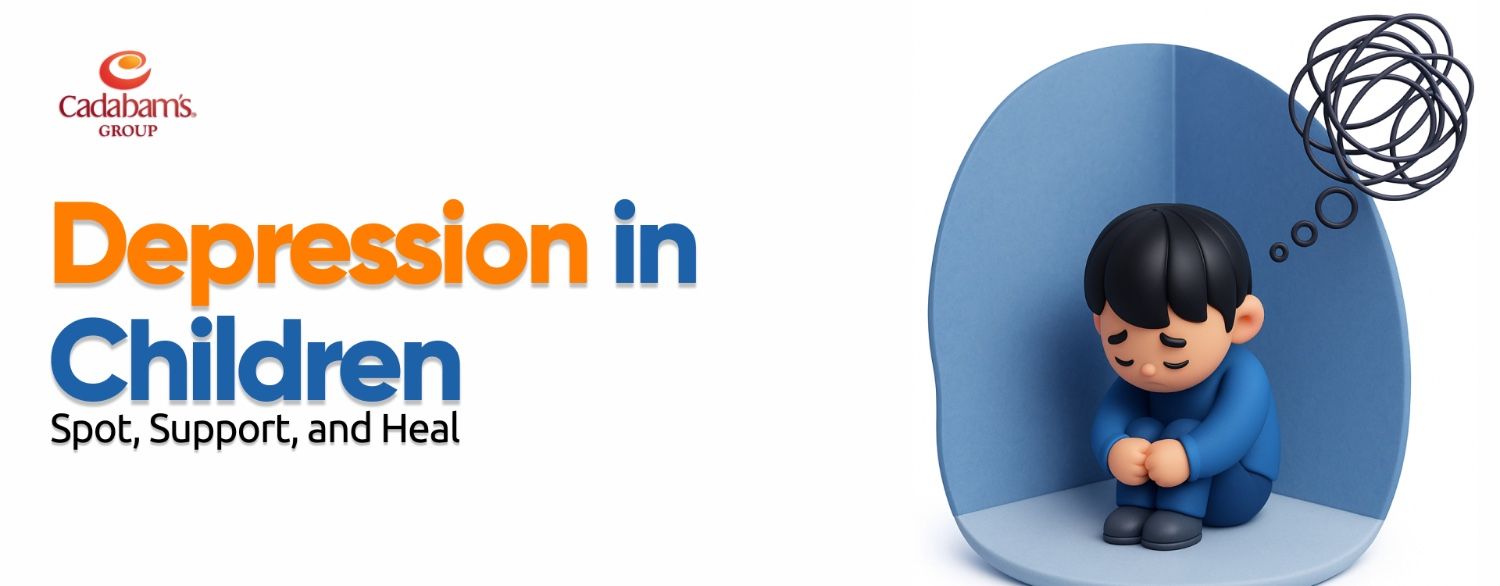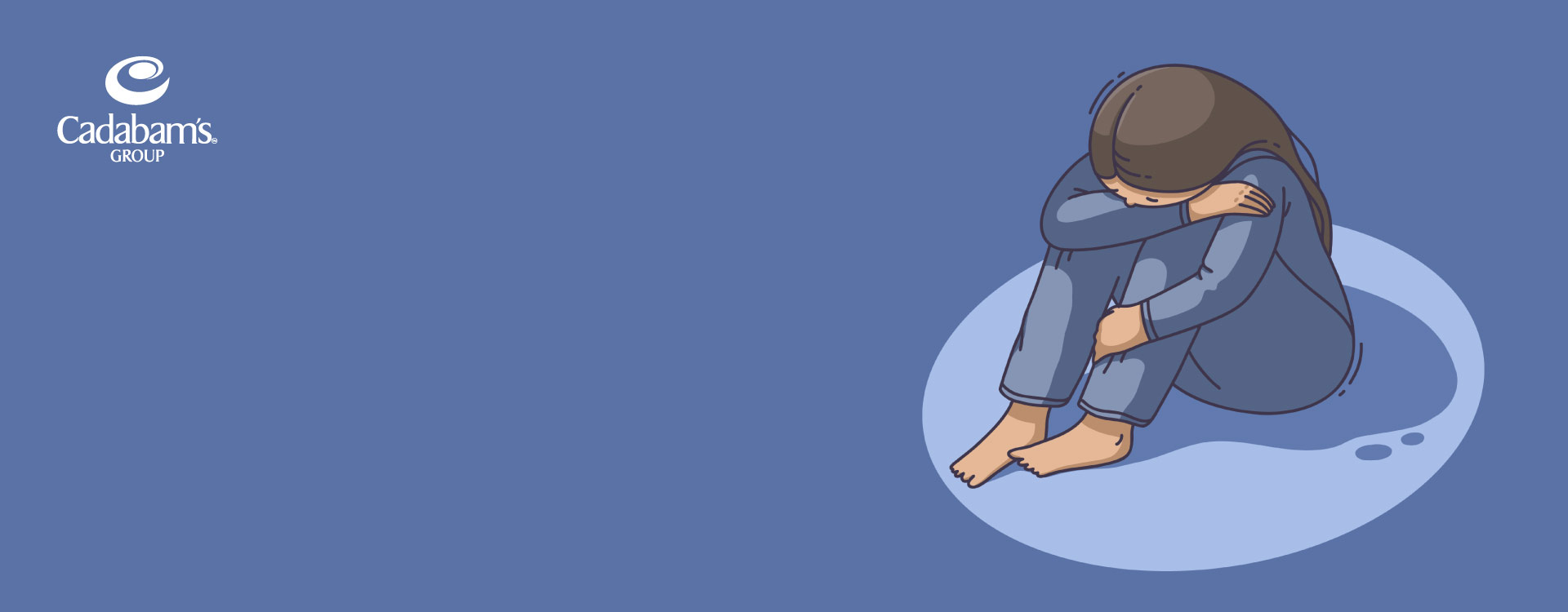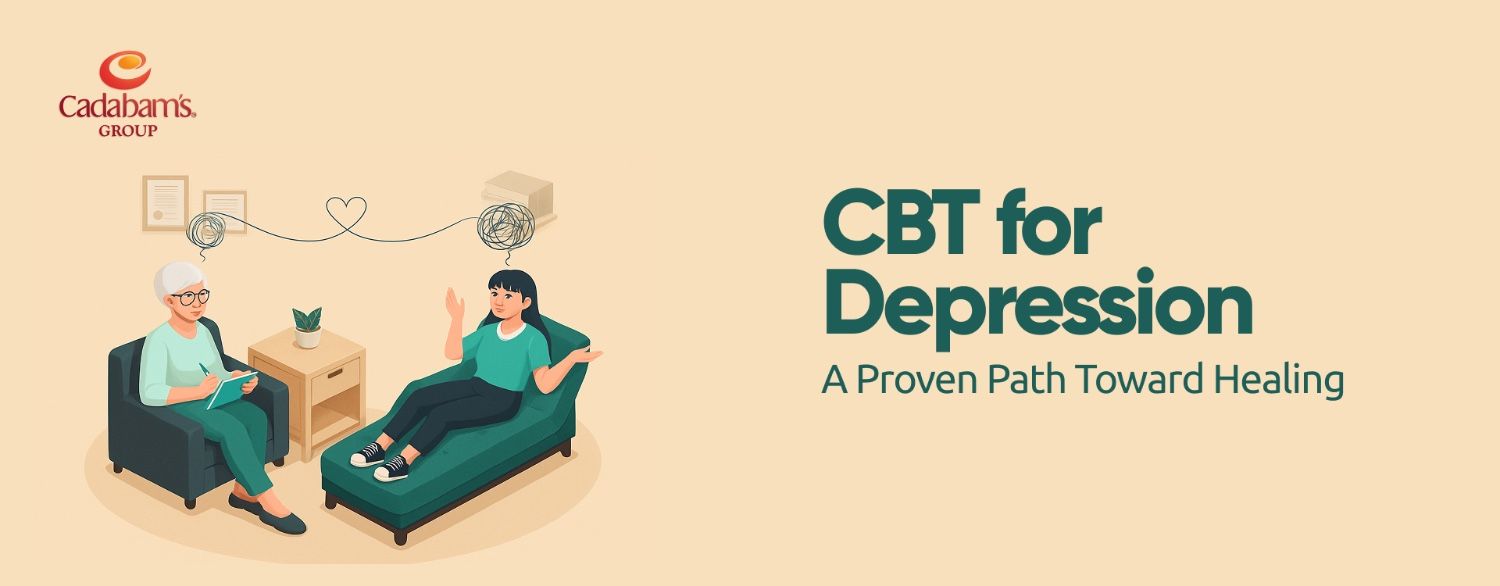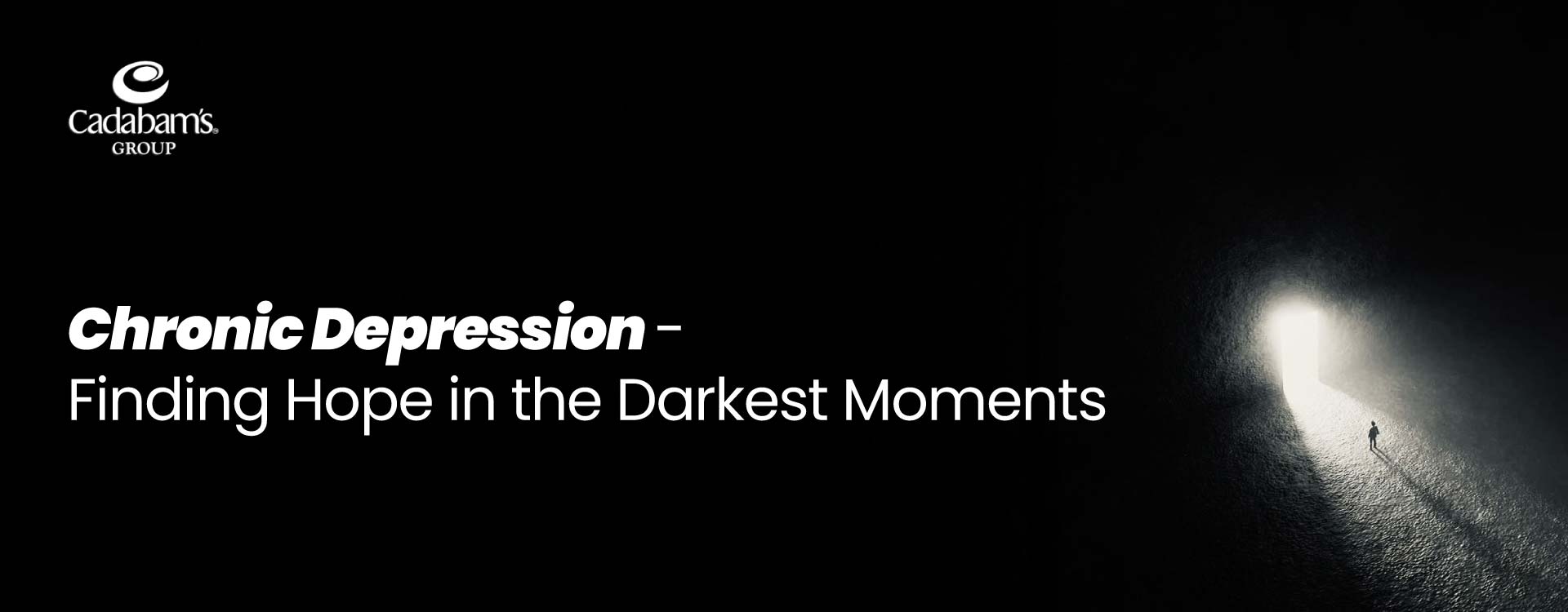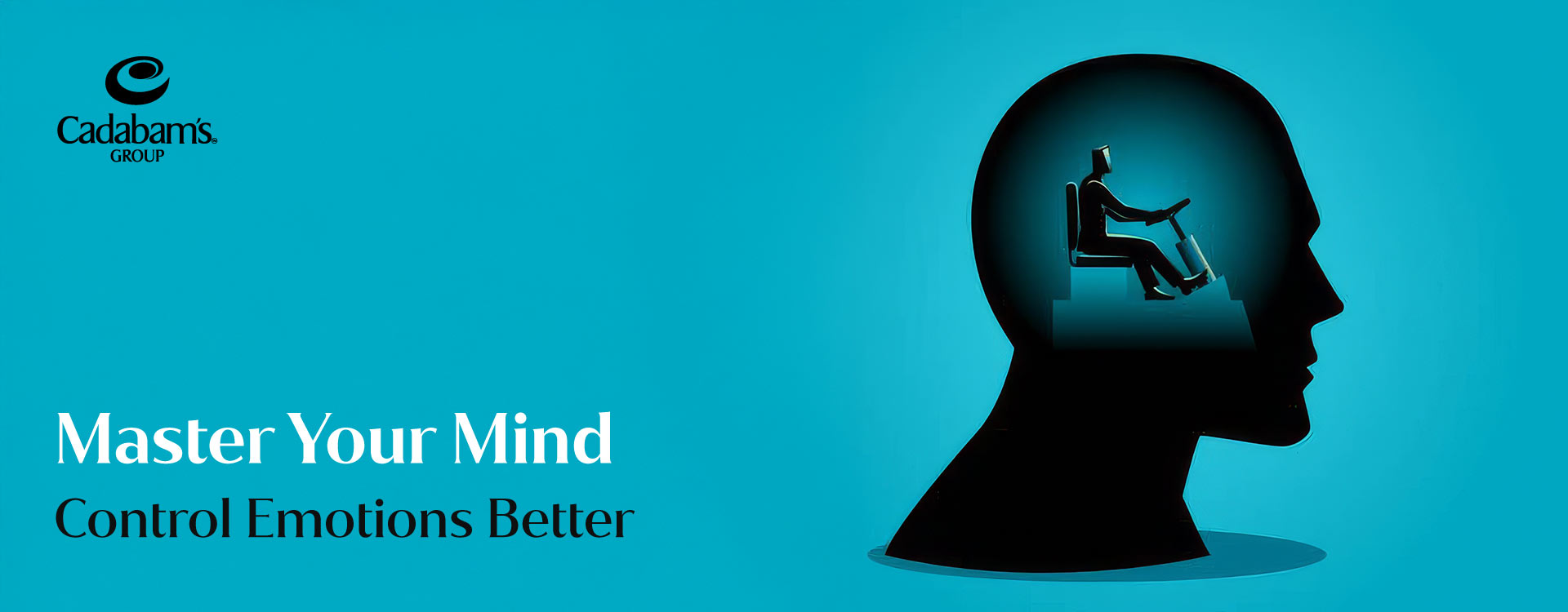Depression
Depression is a serious psychological disorder characterized by intense feelings of sadness, hopelessness, and worthlessness that can severely impact an individual’s levels of functioning in daily life.
If left untreated, it can impact interpersonal relationships and work life and cause the individual to lose interest in their daily activities. According to WHO reports, around 56 million Indians suffer from some form of depression.
Fortunately, with a combination of psychotherapy and medication, depression symptoms can be managed effectively. Cadabams, India’s largest and best mental healthcare center, offers a wide range of depression treatment options best suited to the needs of you or your loved one.
With three decades of experience, Cadabams’ multispecialty team of psychologists, counselors, and psychiatrists offer world-class, solution-oriented depression treatment to help you or your loved one on the path to recovery.
Signs and Symptoms of Depression
Signs of Depression in Young Children
- Prolonged sadness and irritability
- Excessive clinginess
- Frequent worry
- Unexplained aches and pains
- Refusal to attend school
- Appetite changes/underweight
Symptoms of Depression in Teenagers
- Persistent sadness and irritability
- Feelings of worthlessness or negativity
- Anger and poor school performance
- Substance use
- Overeating or oversleeping
- Self-harm
- Loss of interest in activities
- Social withdrawal
Symptoms of Depression in Adults
- Persistent sadness or hopelessness
- Low energy and loss of interest
- Difficulty concentrating or making decisions
- Appetite and sleep changes
- Unexplained aches
- Irritability and social withdrawal
- Substance use
Our Professionals
Causes of Depression
Depression can arise from a combination of genetic, biological, environmental, psychological, and medical factors, each contributing differently to the onset, severity, and persistence of symptoms in individuals.
Genetic Factors: A family history of depression can increase an individual’s chances of developing the disorder. Different genes could lead to the onset of depression. However, there is still a lot of research left to be done in the area.
Biological Factors: Low levels or an imbalance of neurotransmitters that help regulate mood are also associated with depression. These include serotonin, dopamine, and norepinephrine.
Environmental Factors: Traumatic events, adverse childhood experiences, abuse, loss of a loved one, interpersonal conflicts, or work stressors can also cause depression in people.
Psychological or Social Factors: Depression is associated with negative thought patterns or low self-esteem. The way an individual thinks, such as their thought patterns, can also increase the risk of developing depression.
Medical Conditions: Living with chronic pain or long-term health issues like diabetes, heart problems, or thyroid disorders can play a big role in triggering or worsening depression. These conditions can create a persistent state of physical distress or discomfort, which in turn affects an individual's mental health.
Understand the various aspects of this condition

Types of Depression
Depression is not a one-size-fits-all condition and there are multiple types, each with distinct triggers, symptoms, and treatment needs. Understanding the various forms of depression can help individuals and families identify what they or their loved ones may be experiencing, enabling more targeted support and intervention. Below are the most recognised types of depression, including both common and clinically specific disorders.
Clinical Depression (Major Depressive Disorder)
This disorder is characterised by a depressed mood, loss of interest in previously enjoyed activities, and low energy levels for at least 2 weeks.
Persistent Depressive Disorder (PDD)
Persistent Depressive Disorder (PDD), formerly known as dysthymia, is characterised by a chronic state of depression lasting for at least two years. Symptoms are less severe than major depression but more enduring, affecting daily life and functioning.
Disruptive Mood Dysregulation Disorder (DMDD)
Disruptive Mood Dysregulation Disorder (DMDD) is a condition in children and adolescents characterised by severe and recurrent temper outbursts that are disproportionate to the situation, combined with persistent irritability and anger between these outbursts, impacting daily functioning.
Bipolar Affective Disorder/Bipolar Depression
Bipolar Disorder is characterised by recurrent episodes of mania and depression in which the individual affected experiences extremely low moods to extremely high euphoria. This type of depression is treated differently due to the presence of manic episodes.
Psychotic Depression
A person suffering from psychotic depression may experience delusions, hallucinations, and paranoia. These ‘psychotic’ symptoms are normally associated with feelings of hopelessness and worthlessness.
Postpartum (Peripartum) Depression
PPD is a type of depression experienced mostly by women after childbirth. This may be caused by chemical, social, and psychological changes that take place after giving birth. Having PPD can cause difficulties in bonding with the baby.
Premenstrual Dysphoric Disorder (PMDD)
PMDD affects individuals who menstruate. Depression symptoms occur around two weeks before the beginning of menstruation and recede after the cycle.
Atypical Depression
Characterised by symptoms like overeating, oversleeping, and extreme sensitivity to rejection, which may not align with classic depressive symptoms.
Depressive Disorder Due to Another Medical Condition
Depressive Disorder due to another medical condition is diagnosed when depression symptoms directly result from the physiological effects of a separate medical illness. This condition underscores the complex interplay between physical health and mental well-being.
Seasonal Affective Disorder(SAD) (Seasonal Depression)
Seasonal Affective Disorder (SAD), or seasonal depression, is a type of depression that occurs at the same time each year, typically in winter. Symptoms include fatigue, moodiness, and a lack of interest in daily activities.
Find nearest mental health center now

Rehabilitation for Depression
With the proper interventions, individuals can manage their symptoms and reach their potential to lead independent lives. Therapeutic interventions, along with appropriate medication management and community support, can make a huge difference in the treatment of depression in a person. A rehabilitation centre allows mental health professionals to provide the best care for you or your loved one 24/7.
Rehabilitation programs provide individuals with a relaxing and stable environment where mental health services and medication can be availed under one roof. This ensures a safe space for you or your loved one to create a comfortable path to recovery.
Pioneering Support for Your Depression Recovery Journey at Cadabam’s
Cadabam’s is the best rehabilitation centre for depression. At Cadabam’s, our professionals work to curate a holistic and innovative treatment plan best suited to treat depression. These treatment plans are personalised to meet the needs of individual depression symptoms. Along with individual therapy, our world-class facilities also provide group therapies and activities to cater to the individual’s sense of community healing and physical health. This encourages individuals to be constantly engaged and motivated throughout their recovery process.
Cadabams’ broad range of assessments and counselling options makes it one of the best depression treatment centres. Our multispecialty team of professionals is with you every step of the way through your treatment for depression.
If you are searching for a solution to your problem, Cadabam’s Rehabilitation Centre can help you with its team of specialised experts. We have been helping thousands of people live healthier and happier lives for 30+ years. We leverage evidence-based approaches and holistic treatment methods to help individuals effectively manage their Depression. Get in touch with us today. You can call us at +91 96111 94949.
Listen to Our Expert Insights on Depression
Our centres where we treat Depression
Diagnosis of Depression
To reach a diagnosis of depression, a mental health professional would first conduct a series of tests, interviews, and psychometric assessments. These evaluations help the professional understand the individual's symptoms better and provide a look into the current mood states, personality, physical health, and needs of the person. Some of these tests include:
Physical Exam - To diagnose depression, it is essential to rule out any physiological conditions that might be causing depression. Diseases such as anaemia and thyroid disease can increase symptoms of depression and require to be treated differently.
Psychometric Evaluations- Psychometric assessments are used to understand the severity and frequency of symptoms. They also help gauge a person’s personality, mood states, cognitive and verbal abilities, etc.
Family History Taking- Your mental health professional would use family history through interviews to understand the person and their family members' medical history. This would also help to evaluate the duration and possible causes of symptoms, factors contributing to the worsening of symptoms, and interpersonal, work-related, and family dynamics.
With the help of all this information, the mental health professional would find it easier to reach a diagnosis. If the symptoms match the criteria in manuals for psychiatric disorders (DSM 5, ICD 10), the clinician will draw up a depression treatment plan that precisely suits the needs of you or your loved one.
Depression Treatment
Cadabam’s expert psychologists help patients with Depression by providing a blend of evidence-based therapies tailored to individual needs. Depression is a treatable disorder. If you think you or your loved one is showing signs of depression, it is important to seek immediate help. With the appropriate interventions, depression symptoms can be managed, and the person can go back to living their life normally. Depending on how long the symptoms have lasted, how intense they are, and what the person specifically needs, different types of therapy can be used to effectively support someone dealing with depression. Some of the treatments for depression include:
Medication Management - Antidepressants are used to manage symptoms of depression by balancing neurotransmitter levels that help in the regulation of mood. There are different types of antidepressants prescribed, such as SSRIs, SNRIs, etc. It is essential to consult your psychiatrist to know what medication would suit your or your loved one’s needs best.
Cognitive Behavioural Therapy - CBT is a form of therapy that can help individuals identify their negative thought patterns and reframe them into more meaningful thoughts. It establishes the connections between our thoughts and behaviours and how this may be worsening depression symptoms.
Interpersonal Therapy - Interpersonal therapy draws focus to conflicts in interpersonal relationships. By addressing these conflicts and finding ways to solve them, it becomes easier to manage the problems that are contributing to depression.
Family Therapy - Family support is a crucial aspect of psychotherapy that can help family members be aware of the causes, symptoms, and effects of the disorder. This helps them support their loved one and prevent a relapse of symptoms in the future.
Counselling for depression - Through depression counselling, a mental health professional can help you evaluate the problems you are facing and find healthy ways of dealing with them.
Mindfulness-Based Cognitive Therapy - MBCT is a combination of CBT and mindfulness that can help to overcome negative thought patterns using relaxation techniques such as breathing exercises and meditation.
Group Therapy - Group therapy offers individuals a platform to discuss their problems with others who are going through a similar situation as theirs. Talking to people to whom they can relate and hearing other people's journeys motivates a person to continue their journey to recovery.
In some cases, depression is so severe that the individual does not respond to any form of treatment. Cadabam’s offers evidence-based, world-class treatment options for ECT and rTMS for severe depression treatment.
Electroconvulsive Therapy - ECT is a form of therapy in which electrical stimulation is carefully passed through the brain. This alters brain activity and relieves severe depression symptoms.
Repetitive Transcranial Magnetic Stimulation - rTMS is a form of therapy in which magnetic impulses are passed into the affected part of the brain. This helps to regulate the moods of the individual and manage depression symptoms.
Self-Care and Management Strategies for Depression
Self-care and management strategies are crucial for individuals dealing with depression, focusing on holistic well-being to mitigate symptoms.
Staying active on a regular basis can help lift your mood by triggering the release of feel-good chemicals called endorphins.
Prioritising quality sleep is essential, as poor sleep patterns can exacerbate depressive symptoms.
A healthy diet rich in fruits, vegetables, and whole grains supports overall brain health.
Additionally, avoiding alcohol is essential, as it can interfere with mood and the effectiveness of antidepressant medications, potentially worsening depression.
Can Depression be Prevented?
While depression cannot always be prevented entirely, certain proactive steps can reduce the risk. Building strong social support systems, managing stress effectively, maintaining a healthy lifestyle, and seeking early professional help for emotional difficulties can make a significant difference. For individuals with a family history or past experiences of depression, regular mental health check-ins and professional guidance can aid in early detection and timely intervention.
Seeking Help for Depression
Seeking professional help for depression enables accurate diagnosis, effective therapy, and emotional support. Early intervention improves recovery outcomes and reminds individuals that they are not alone in their mental health journey.
Depression is a Treatable Condition
It's crucial to acknowledge that depression is a real illness impacting many aspects of life. However, it's equally important to remember that help is available. Individuals can manage their symptoms and recover with the right combination of therapy, medication, and support. Access to professional care and support networks can significantly improve outcomes, making depression a treatable condition.
Consult a Healthcare Professional
Consulting a healthcare professional is the first step towards overcoming depression. For expert guidance and compassionate care, consider reaching out to Cadabam’s. Our experienced team is dedicated to providing personalised treatment and support, ensuring you're not alone in your journey to wellness.
Request a Thorough Evaluation
Patients should openly discuss their concerns with their healthcare provider and insist on a thorough evaluation to accurately address their mental health needs. A thorough evaluation helps create a treatment plan that’s personalised to someone’s unique symptoms and struggles, making it easier to treat depression in a more focused and effective way.
When to Get Emergency Help for Depression?
If you or someone you care about is having thoughts of self-harm or suicide, getting immediate help is absolutely essential. In such urgent situations, Cadabam’s offers immediate support and intervention. Our team is ready to provide the necessary care and guidance to navigate this crisis, ensuring safety and beginning the journey to recovery.
Cadabam’s counsellors assist patients by employing a personalised approach that integrates psychotherapy and holistic support, helping individuals to develop coping mechanisms and resilience in managing the symptoms of their conditions.
Find out about centres, daily updates and more about mental health

Why Choose Cadabams for Depression?

33+ years of focused mental healthcare, shaped by 1000+ real patient journeys.

State of the art mental health centres built for treatment and recovery.

A coordinated team of psychiatrists, psychologists, counsellors, and rehabilitation specialists supporting your care.

Support from early signs through treatment and recovery.

Treatment guided by clear plans that continue beyond diagnosis.

Planned follow ups and continued guidance to help maintain progress over time.
Facilities & Amenities
Frequently Asked Questions
Yes, depression can be treated successfully through a combination of therapy, medication, lifestyle changes, and support from loved ones. Early intervention improves outcomes, and many people recover fully or manage symptoms effectively with proper treatment.
Depression is a mental health disorder marked by persistent low mood, loss of interest, and changes in sleep, appetite, and energy. Unlike normal sadness, it lasts for weeks or longer and significantly affects daily functioning. Feeling sad is temporary, while depression requires professional care.
Overcoming depression needs support and professional assistance. With the right assistance and treatment, individuals can overcome the disorder and can lead happy and fulfilling lives.
Identifying the early signs of the disorder becomes a huge part of helping someone with depression. The next step is to slowly guide them to seeking help from a professional. Another way to help is to remain supportive and patient as they battle the disorder.
Depression can cause serious injury and harm. Thoughts of self-harm and death are associated with untreated and severe depression. The individuals may act on these impulses and be a threat to themselves and the people around them. It is important to seek early and prompt assistance for depression from mental health professionals.
Depression is a serious mental health disorder that is characterized by prolonged periods of sadness and grief. It is a disorder that is the leading cause of disability in the world. Depression also causes threat to life as it can lead to self-harm and suicidal thoughts.
Case Studies
Our Programs
Our Testmonials
Blogs you may be interested in
Helpline at your fingertips
+91 9611194949

.webp)








-min.webp)



.avif)

-min.webp)

.avif)

.avif)
.webp)

